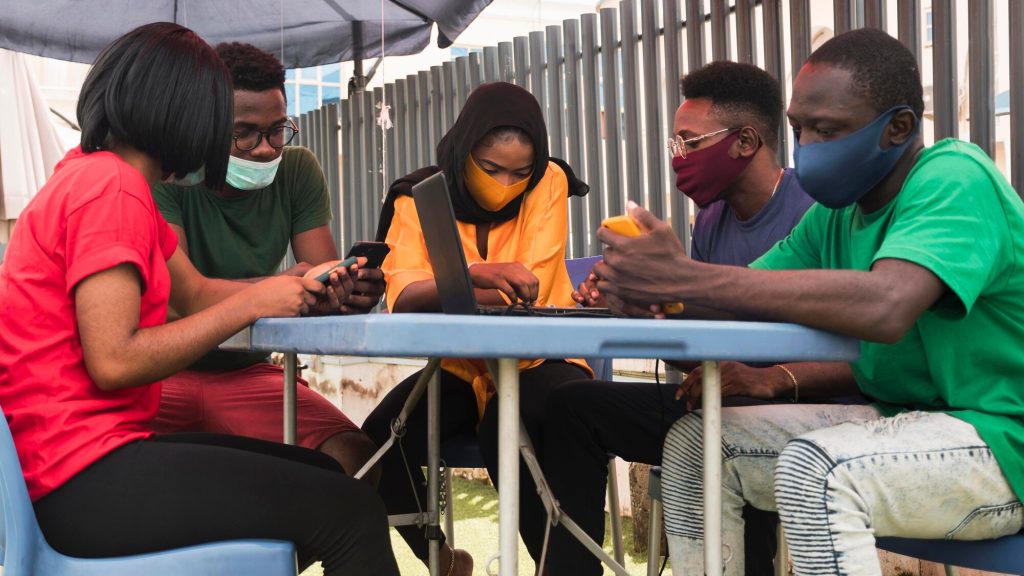
Overview of Digital Development in Africa
Africa is witnessing a rapid digital transformation, with internet penetration growing steadily across the continent. According to the International Telecommunication Union (ITU), the internet penetration rate reached 33% in 2021, with significant growth expected in the coming years; this is providing new opportunities to address various health challenges, including sexual and reproductive health (SRH) among young people.
Digital Health Interventions for Youth SRH
Digital health interventions are playing a crucial role in improving SRH outcomes among African youth. Mobile health applications, telemedicine, and online platforms are increasingly being used to provide essential services and information.
Applications like “MyPaddi” in Nigeria offers great insights on sex, contraceptives, abuse, health and consultation. These apps are particularly popular among young people, providing a safe space to discuss sensitive topics and access reliable information.
Platforms such as “Babyl” in Rwanda and “MDoc” in Nigeria provide telemedicine services, including SRH consultations. These services are vital for young people who may face barriers to accessing in-person healthcare, such as stigma or geographic distance.
Initiatives like “Tiko” in South Africa use social media and websites to disseminate SRH information to the youth. By leveraging popular channels like Instagram and Facebook, they reach a wide audience, promoting awareness and healthy behaviors.
Dr. Matshidiso Moeti, WHO Regional Director for Africa.
Increased, Discreet, and Convenient Access to Information & Services
In recent years, Africa has experienced a significant surge in digital development, with increased access to the internet and mobile technology. This digital revolution has brought about both positive and negative impacts on various aspects of African society, including SRH among the youth.
One of the most notable impacts of digital development on the SRH of African youth is the increased access to information. With the proliferation of social media platforms and online resources, young people now have more opportunities to learn about SRH, contraception, and family planning. This has empowered them to make more informed decisions about their sexual health, leading to a decrease in risky behaviors and unintended pregnancies.
Furthermore, digital platforms have provided a means for young people to access SRH services in a more discreet and convenient manner. Through telemedicine and online consultations, youth can seek advice from healthcare professionals without fear of stigma or judgment. This has been particularly beneficial in rural areas where access to traditional healthcare services may be limited.
For instance, “Clafiya” in Nigeria and “Zipline” in Ghana connect users to nearby healthcare providers via mobile platforms, ensuring even those in remote locations can access necessary services. However, the digital divide remains a challenge, with disparities in access to smartphones and the internet. Efforts to improve digital literacy and provide affordable internet access are essential for equitable service delivery.
Challenges and Barriers
Despite the progress, several challenges hinder the full potential of digital health interventions in SRH:
Exposure to Explicit Content: The widespread availability of explicit content online has contributed to a rise in early exposure to sexual content, which can lead to misconceptions about sexuality and unhealthy attitudes towards relationships.
Risky Online Behavior: The anonymity and perceived privacy of online interactions have resulted in an increase in risky sexual behaviors, including unsafe sexual practices and the potential for exploitation and abuse.
Data Privacy and Security: Ensuring the confidentiality and security of young users’ health data is critical. Many young people are hesitant to use digital health services due to privacy concerns.
Digital Literacy: Not all young people, particularly in rural areas, have the skills to navigate digital health platforms. Training and education are essential to maximize the benefits of digital health.
Infrastructure: While internet penetration is increasing, inconsistent power supply and limited network coverage in some areas pose significant barriers.
Policy and Future Directions
African governments have recognized the potential of digital health and are working to create an enabling environment for its growth. Policies that support the development of digital health infrastructure and promote public-private partnerships are essential.
Future trends in digital health for youth SRH in Africa include the integration of artificial intelligence (AI) to provide personalized health recommendations and the use of blockchain technology to ensure data security. Continued investment in digital infrastructure and efforts to bridge the digital divide will be crucial to the success of these initiatives.
Youth-Focused Policies: Policies need to be “youth-proofed,” ensuring they address the unique needs of young people, including acceptability, availability, affordability, and accessibility. This involves creating digital health systems that are culturally appropriate and inclusive of all young people, regardless of their socio-economic status or location.
Amplifying Youth Voices: It is crucial to involve young people in the development and implementation of digital health solutions. By engaging youth in the design and decision-making processes, programs can be more effectively tailored to meet their needs and preferences.
The Role of Young People in Digital Health
Young people are key stakeholders in the digital health revolution for several reasons:
1. Facilitators of Digital Health Literacy: With their proficiency in digital technology, young people can help their communities access and utilize digital health tools effectively, thereby promoting informed health choices.
2. Understanding Community Needs: Young people can identify and address the specific health literacy needs within their communities, ensuring that digital health solutions are appropriately tailored and equitable.
3. Innovators of Digital Solutions: As digital natives, young people have the potential to create innovative digital health solutions that meet evolving health needs. Their involvement in co-designing these solutions ensures that they are user-friendly and relevant.
Dr. Ayoade Alakija, Special Envoy for the ACT-Accelerator, WHO.
Conclusion
Digital development is revolutionizing sexual and reproductive health among African youth, providing innovative solutions to longstanding challenges. By leveraging mobile health applications, telemedicine, and online education platforms, Africa can improve SRH outcomes for young people, particularly in underserved populations. Addressing challenges such as data privacy, digital literacy, and infrastructure is essential to ensure everyone benefits from these advancements. The future of digital health in Africa is promising, with the potential to significantly enhance SRH services and outcomes for the youth.